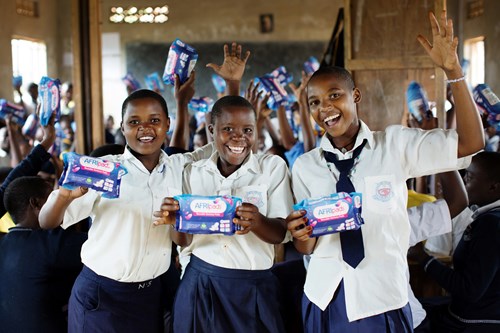Loveled Foundation in partnership with Nigerian Girl Guides Association and others have urged governments to give tax reduction on importation of menstrual products.
They also urged free distribution of sanitary pads to girls in rural communities just as condoms are given free. They made the call during the distribution of free reusable sanitary pads to teenage girls in Ifako-Tomaro Community, Apapa, Lagos State to prevent health implications arising from poor practice.
It was part of efforts to mark World Menstrual Hygiene Day, According to statistics from the World Bank, at least 500 million women and girls globally lack access to menstrual products and adequate facilities for menstrual hygiene management (MHM), with Nigeria accounting for 25 per cent of the number.
At the event tagged Sanitary Pads Drive 1.0, which held at the weekend, the teenage girls were also lectured on proper menstrual hygiene living and thought how to make reusable pads. The Trumpet Gathered
The Founder, Loveled foundation, Chika Ewuziem, said lack of proper menstrual hygiene has been a major issue affecting teenage girls in the rural areas, especially Islands where government and corporate entities seem to have neglected.
He said poor menstrual hygiene, however, can pose serious health risks, like reproductive and urinary tract infections which can cause future infertility and birth complications.
Read Also: We’re decentralizing Edo health system, enhancing access to quality healthcare, says Obaseki
He also noted that inadequate sanitary facilities, lack of access to affordable and quality menstrual hygiene products, and the stigma and social norms associated with menstruation contributes poor menstrual hygiene.
Ewuziem, said driven by the need to address the situation, especially with the price of sanitary pads up to 500 per cent, the foundation with its partners distributed free menstrual hygiene kits to teenage girls in the community and also equip them with information and knowledge on how to make reusable sanitary pads for themselves.
The Youth Coordinator, Nigerian Girls Guide Association, Lagos State Chapter, Adebayo Taiwo Ayomide, said menstrual hygiene practice in the country is poor, which calls for more sustainable solutions to teenage girls through production of reusable pads.
She said with economic hardship on the rise and teenage girls exposed to unhealthy materials, the government should reduce taxes placed on menstrual hygiene products so that the prices would reduce.
Ayomide also added that, just like condoms are given out freely, sanitary pads should be given out free to bring about sustainable solutions to challenges of menstrual hygiene among teenage girls.
Also, the Founder, Iyanu Reusable Pad Empowerment Project, Shonde Iyanuoluwa, said they are empowering girls on how to eradicate menstrual period poverty by distributing free reusable sanitary pads to the teenage girls in rural communities, which will last them for about two years.
She expressed worry on harmful materials used by teenage girls during their menstrual period, such as animal dunks, tissue papers and pieces of dirty clothes, which could cause great harm to the girls.
She said poverty has limited many teenage girls from assessing healthy menstrual products, which is why the reusable sanitary pads are being taken to the community.
A mother in the community, Mariam Agunbiade, expressed appreciation to the foundation for the initiative, saying it will go a long way in helping families that can’t afford buying sanitary pads for their teenage girls.
She said most of the families in the community are very poor, hence, their teenage girls use pieces of clothe or tissue paper during their menstrual period.
Agunbiade also thanked the foundation for teaching the girls how to make reusable sanitary pads, noting that it is a form of empowerment.
She said there are no primary health care facilities in the community except one privately owned heath facility with a nurse and a medicine store where the pads are being sold, but expensive.
Click The Trumpet and follow us on Twitter for more.






